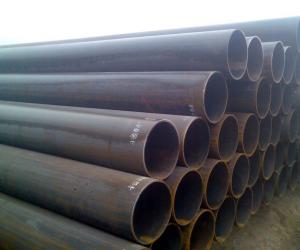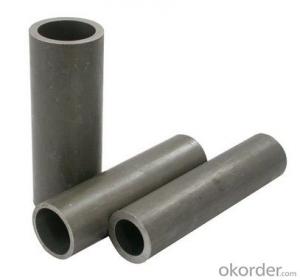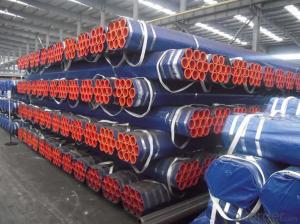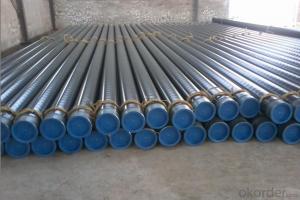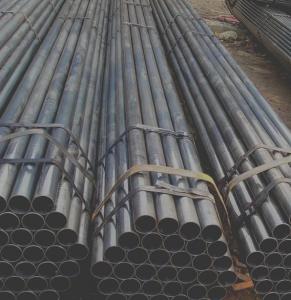Carbon Seamless Steel Pipe API 5L of 4 Inch Hot Sale Structuer Application
- Loading Port:
- Tianjin
- Payment Terms:
- TT or LC
- Min Order Qty:
- 25 m.t.
- Supply Capability:
- 10000 m.t./month
OKorder Service Pledge
OKorder Financial Service
You Might Also Like
1、Structure of Carbon Seamless Steel Pipe API 5L of 4 Inch:
Seamless pipe is formed by drawing a solid billet over a piercing rod to create the hollow shell.
As the manufacturing process does not include any welding, seamless pipes are perceived to be stronger and more reliable.
Historically seamless pipe was regarded as withstanding pressure better than other types, and was often more easily available than welded pipe.
2、Main Features of Carbon Seamless Steel Pipe API 5L of 4 Inch:
• High manufacturing accuracy
• High strength
• Small inertia resistance
• Strong heat dissipation ability
• Good visual effect
• Reasonable price
3、Carbon Seamless Steel Pipe API 5L of 4 Inch Images :
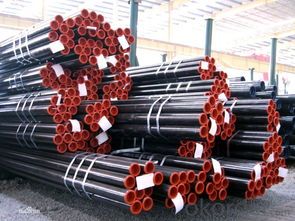
4、Packaging & Delivery
Packaging Details: | seaworthy package,bundles wrapped with strong steel strip |
Delivery Detail: | 15-30days after received 30%TT |
5、Carbon Seamless Steel Pipe API 5L of 4 Inch Hot Sale Structuer Application Specification:
Standard | GB, DIN, ASTM |
Grade | 10#-45#, 16Mn |
Thickness | 8 - 33 mm |
Section Shape | Round |
Outer Diameter | 133 - 219 mm |
Place of Origin | Shandong, China (Mainland) |
Secondary Or Not | Non-secondary |
Application | Hydraulic Pipe |
Technique | Cold Drawn |
Certification | API |
Surface Treatment | factory state or painted black |
Special Pipe | API Pipe |
Alloy Or Not | Non-alloy |
Length | 5-12M |
Outer Diameter | 21.3-610mm |
Grade | 20#, 45#, Q345, API J55, API K55, API L80, API N80, API P110, A53B |
Standard | ASME, ASTM |
1.Material:20#(ASTM A 106/A53 GRB.API5LGRB,GB),45#,16Mn,10#.
2.Specification range:OD:21.3-610mm,WT:6-70mm,length:6-12m or according to the requirement of clients.
3.Excutive standards:GB,ASME API5L.ASTM A 106/A53,Despite of the above standards,we can also supply seamless steel pipe with standard of DIN,JIS,and so on,and also develop new products according to the requirements of our clients!
4.Surface:black lacquered,varnish coating or galvanized.
5.Ends:Beveled or square cut,plastic capped,painted.
6.Packing:bundles wrapped with strong steel strip,seaworthy packing.
5、FAQ of Carbon Seamless Steel Pipe API 5L of 4 Inch Hot Sale Structuer Application:
①How is the quality of your products?
Our products are manufactured strictly according to national and internaional standard, and we take a test
on every pipe before delivered out. If you want see our quality certifications and all kinds of testing report, please just ask us for it.
Guaranteed: If products’ quality don’t accord to discription as we give or the promise before you place order, we promise 100% refund.
②How about price?
Yes, we are factory and be able to give you lowest price below market one, and we have a policy that “ for saving time and absolutely honest business attitude, we quote as lowest as possible for any customer, and discount can be given according to quantity”,if you like bargain and factory price is not low enough as you think, just don’t waste your time.Please trust the quotation we would give you, it is professional one.
Any question, pls feel free to contact us !
- Q:How are steel pipes used in sewage systems?
- Steel pipes are commonly used in sewage systems for their strength, durability, and resistance to corrosion. These pipes are used to transport sewage and wastewater from homes, businesses, and industrial facilities to treatment plants or disposal sites. They are ideal for underground installations due to their ability to withstand high pressure and the weight of the surrounding soil. Additionally, steel pipes can be welded together, providing a seamless and leak-proof system that ensures the safe and efficient transportation of sewage.
- Q:Can steel pipes be used for compressed air systems?
- Yes, steel pipes can be used for compressed air systems. Steel pipes are commonly used in industrial applications due to their high strength and durability. They can withstand the pressure and temperature variations associated with compressed air systems, making them a suitable choice for such applications.
- Q:What industries typically use steel pipes?
- Steel pipes find widespread use across various industries due to their durability, strength, and versatility. Some of the sectors that typically employ steel pipes include: 1. Construction: Steel pipes are extensively utilized in the construction industry for diverse purposes like structural support, plumbing, and underground piping systems. They are commonly seen in commercial buildings, residential structures, bridges, and tunnels. 2. Oil and gas: The oil and gas industry heavily relies on steel pipes for drilling, transporting, and distributing oil and gas. Steel pipes are employed in offshore drilling rigs, oil refineries, natural gas processing plants, and pipelines to ensure the safe and efficient transport of these valuable resources. 3. Water and wastewater: Steel pipes play a crucial role in providing clean water supply and managing wastewater. They are used in water treatment plants, desalination facilities, and municipal water distribution systems. Steel pipes are also essential for sewage and stormwater management. 4. Manufacturing: Various manufacturing industries employ steel pipes for specific applications. For example, automobile manufacturers use steel pipes in exhaust systems, fuel lines, and hydraulic systems. Steel pipes are also utilized in the production of machinery, equipment, and appliances. 5. Mining: The mining industry requires robust and enduring materials for its operations. Steel pipes are used in mining applications such as conveying materials, ventilation systems, and underground infrastructure. They prove particularly useful in transporting minerals, ores, and other mining byproducts. 6. Energy and power: Steel pipes find extensive use in power generation facilities, including thermal power plants, nuclear power plants, and renewable energy installations. They are employed in steam pipelines, cooling systems, and heat exchangers. Steel pipes are also used in the construction of transmission lines for electricity distribution. 7. Infrastructure and transportation: Steel pipes are essential for infrastructure development and transportation systems. They are used in the construction of roads, bridges, railways, and airports. Steel pipes also play a role in the transportation of fluids and gases, such as in natural gas or petroleum product pipelines. Overall, the versatility and dependability of steel pipes make them indispensable in a wide range of industries, contributing to various aspects of our modern infrastructure and daily lives.
- Q:Can steel pipes be used for underground water supply systems?
- Indeed, underground water supply systems can utilize steel pipes. These pipes, being robust and resistant to corrosion, are well-suited for subterranean purposes. They possess the ability to endure high water pressure, facilitate effective water flow, and exhibit a lengthy lifespan. Nevertheless, it is imperative to guarantee the steel pipes are adequately coated and safeguarded against corrosion to avert any water supply contamination. Furthermore, due to their heavier nature in comparison to alternative materials, additional support may be necessary during installation. To identify any potential concerns and avoid leaks or harm to the underground water supply system, proper maintenance and regular inspections are of utmost importance.
- Q:How are steel pipes used in the aerospace industry?
- Steel pipes are commonly used in the aerospace industry for various applications such as fuel lines, hydraulic systems, and structural components. These pipes provide strength, durability, and resistance to high pressure and extreme temperatures, making them ideal for delivering fluids and gases, supporting critical systems, and ensuring the structural integrity of aircraft and spacecraft.
- Q:What are the different methods of pipe protection for steel pipes?
- Steel pipes can be protected in various ways, each with its own purpose and level of defense. Some commonly used methods include: 1. Coatings: To shield steel pipes from corrosion and environmental factors, coatings are applied to the outer surface. These can be paints, epoxies, or polymers that create a barrier between the pipe and its surroundings, preventing contact with corrosive elements. 2. Wrapping: Another method involves using materials like tape or shrink wrap to cover the steel pipe, providing a physical barrier against moisture, chemicals, and corrosive substances. Wrapping is often combined with coatings to enhance protection. 3. Cathodic Protection: This electrochemical method safeguards steel pipes from corrosion by connecting them to a sacrificial anode, typically made of zinc or magnesium. The anode corrodes instead of the pipe, preventing deterioration. It is commonly used for buried or submerged pipelines. 4. Thermal Insulation: Steel pipes exposed to extreme temperatures can be protected with thermal insulation. Materials like foam or mineral wool are applied around the pipe to minimize heat transfer. This is particularly important for pipes carrying hot fluids or in harsh weather conditions. 5. Vibration Dampening: Vibrations can damage steel pipes by causing stress and fatigue. To counter this, techniques like vibration damping pads or supports and clamps can be used. These methods absorb and dissipate the energy generated by vibrations, reducing the risk of pipe failure. 6. Concrete Coating: For pipelines installed underwater or in highly corrosive environments, concrete coating is often employed. A layer of concrete or cement-based mortar is applied to the steel pipe, providing both mechanical protection and resistance to corrosion. Choosing the appropriate method of pipe protection depends on the specific application, environmental conditions, and desired level of defense. Regular inspection and maintenance are also crucial in maintaining the long-term integrity of steel pipes.
- Q:What are the different types of joints used in steel pipes?
- There are several types of joints commonly used in steel pipes, including threaded, welded, flanged, and grooved joints.
- Q:Are steel pipes resistant to impact?
- Yes, steel pipes are generally resistant to impact due to their high strength and durability.
- Q:What are the standard dimensions for steel pipes?
- The standard dimensions for steel pipes vary depending on the application and industry. However, common sizes range from ½ inch to 48 inches in diameter and have various wall thicknesses based on the required strength and pressure rating.
- Q:What is the process of spiral steel tube production?
- Butt welding: the use of advanced double submerged arc welding technology for pre welding, internal welding, external welding. The welded steel tubes are cut into standard lengths using a plasma gage.
1. Manufacturer Overview |
|
|---|---|
| Location | |
| Year Established | |
| Annual Output Value | |
| Main Markets | |
| Company Certifications | |
2. Manufacturer Certificates |
|
|---|---|
| a) Certification Name | |
| Range | |
| Reference | |
| Validity Period | |
3. Manufacturer Capability |
|
|---|---|
| a)Trade Capacity | |
| Nearest Port | |
| Export Percentage | |
| No.of Employees in Trade Department | |
| Language Spoken: | |
| b)Factory Information | |
| Factory Size: | |
| No. of Production Lines | |
| Contract Manufacturing | |
| Product Price Range | |
Send your message to us
Carbon Seamless Steel Pipe API 5L of 4 Inch Hot Sale Structuer Application
- Loading Port:
- Tianjin
- Payment Terms:
- TT or LC
- Min Order Qty:
- 25 m.t.
- Supply Capability:
- 10000 m.t./month
OKorder Service Pledge
OKorder Financial Service
Similar products
New products
Hot products
Hot Searches
Related keywords
